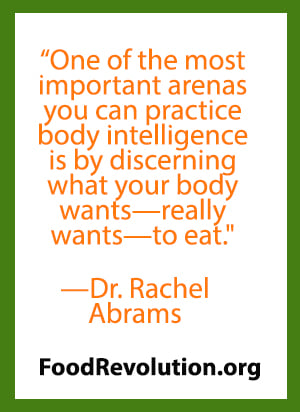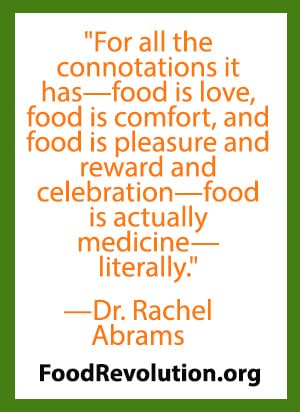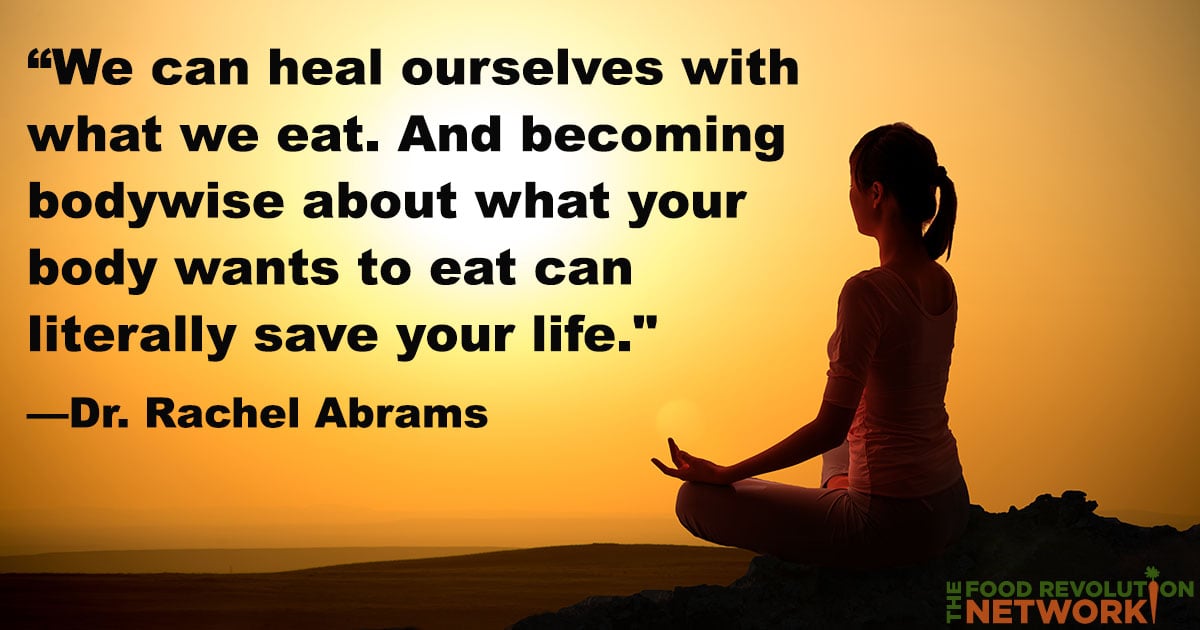We are all gifted with innate body wisdom. Being bodywise means connecting to the great intelligence that has evolved in our bodies through millennia of evolution. This embedded body wisdom kept us safe, helped us forage for food, and helped us find good mates.
In our modern culture, with our ability to eat, work, travel, and communicate without paying almost any attention at all to our body’s sensations, it is easy to forget that our body is constantly speaking to us. In the most basic of ways—sensing hunger, pain or fatigue—and in more complex “gut intuitions” about people and situations, our bodies “speak to us” all the time.
As a physician, I believe that my patients’ ability to sense and interpret their own body intelligence is the most important diagnostic tool I have in the room. For example, my patients, if they can pay attention to their body’s communication, can differentiate between belly pain that is caused by something they ate, belly pain that is caused by stress or anxiety, or belly pain that is from something more serious, like a diseased gall bladder or appendix.
 One of the most important arenas you can practice body intelligence is by discerning what your body wants—really wants—to eat.
One of the most important arenas you can practice body intelligence is by discerning what your body wants—really wants—to eat.
Given the confusing world of competing food recommendations, the pressure to look a certain way, and the intense marketing of foods that are bad for us, it is not a simple feat to sense one’s body intuition around eating. Add to that the intensely addictive quality of food—especially sugar, salt and processed foods—and it can be a challenge to hear what your body really wants.
You can use the bodywise tools to help discern what your body needs and wants and what is habitual, emotional, or addictive eating. For some of us, the first challenge is to actually sense and recognize hunger. Equally important is the ability to recognize and experience fullness. People who clearly sense these simple cues are much less likely to have trouble staying at what is a healthy weight for them.
When you stop to listen to your body’s cues, you may find that you’re not actually hungry at all. Most of us, myself included, use food as a reward from time to time; we also eat when we’re in a bad mood, upset, bored, and for all kinds of reasons beyond true hunger. Waiting to eat until you’re actually hungry is a great skill and a real part of being bodywise. Becoming aware of the different cues that make you reach for a snack is the first step in shifting your habits away from eating and on to other experiences that can fulfill you.
Here is a bodywise exercise that can be helpful in getting in touch with your hunger signals:
- Next time you’re hungry, take a few deep belly breaths. Putting your hand on your belly, close your eyes and breathe deeply until your belly moves your hand out.
- Now breathe into your belly itself, right into that feeling of hunger. Try to sense the details of the feeling. Is it gnawing? Empty? Painful? Where exactly do you feel the sensation of hunger?
- When you gently consider the feeling of hunger, do any emotions arise? If the emotion is “I am lightheaded and going to pass out if I don’t have a snack,” perhaps it is time for a snack. If the emotion is, “I’m ____________” (fill in the blank: bored, angry, sad, scared, anxious), you may want to take a minute to consider your food choice.t
- Remember that emotional or addictive eating requires that you eat whatever you are craving immediately. Just taking a moment to consider what your body is actually saying can save you from the pint of Häagen-Dazs. And maybe, instead, you need to take a break from work, call a friend, or go scream in the bathroom. Whatever works.
Listening to what your body wants is important. Indulging the daily craving for a bag of cookies is a different story, but we all need feel-good rewards now and then. It’s only human. When I try to help my patients stop smoking, drinking, or overeating, I often help them to strategize new “treats” that will be less destructive. Nonfood treats can include a hot bath, going outside for a walk/run, putting on loud music that you love and dancing, calling your best friend, reading a book, watching a show you love, or having great sex. All very healthy. Lots of possibilities. And then, when you’re actually hungry from your dancing, walking, talking, bathing, or sex activity, you can get some food.
There are some food cravings that are physiologic. For example, when I’m sleep deprived (and as a doctor and mother of twins, I have had a lot of practice at this), I crave sugar. But what I’ve learned is that my tired body is telling me, “Get me some quick energy here, I’m dying…” And what I really need is a nap. And sometimes, for real, I crave kale, especially after a long day of work when my body needs sustenance. I know, I’m a geek. But when I really listen, my body tells me it wants all those killer vitamins and minerals. Which is what I tell myself when I crave coffee—all those good antioxidants…
Sometimes, we need food alternatives. If you are really going to lay off the potato chips, you may need a replacement. For starters, don’t keep your “food crack” in the house (i.e. the foods that you’re addicted to). That’s not to say that I believe you should never snack; my advice, though, is to find healthy substitutes that will fulfill your cravings without breaking the caloric and nutritional banks. If crunchy/salty is your thing, consider baked nori seaweed with sesame oil and salt (I admit to being fully addicted to this), kale chips, or popcorn—just don’t make a gallon of it. And if sweet is your thing—you’re going to think I’m nuts—but pureed avocado with chocolate powder and sweetener (honey, stevia, agave) also really does taste like chocolate pudding. I swear.
Now, it’s important to note that food addiction is a real thing, especially in the case of processed snack foods, fast food, and sugar, in general. These foods actually set up a dopamine response in your brain that puts you into painful withdrawal when you stop eating them—causing irritability, anxiety, and intense craving.
If this sounds familiar to you, you likely have a real food addiction. And food addiction, like any addiction, can be difficult to break. If it is a specific food that you crave (sugar, soda, and chips are the most common in my practice), you are probably going to need to stop eating it entirely. It will be difficult for 1 to 2 weeks, as you “withdraw” from the cravings, but then your brain will adjust, and the cravings will ease. As long as you don’t eat it. Just like stopping smoking, choose a time to stop eating your addictive food that is fortuitous—you’re busy doing something else you love, your kids are gone to summer camp, the knives have been removed from the house—whatever works. Set a date. Get that shit out of your home. Tell everybody what you’re doing and get their support. And stop eating it. You can do this. And if you need additional support, there are many resources for people with food addictions, from Food Addicts Anonymous to Overeaters Anonymous.

Most importantly, be kind to yourself. So if you promised not to eat potato chips, and in the process of making the stinking kale chips, you burned them and in frustration drove to 7-Eleven to get the potato chips, relax. Take a breath. We are human. We err. A lot. And we pick ourselves up and move on. One less potato chip at a time.
For all the connotations it has—food is love, food is comfort, and food is pleasure and reward and celebration—food is actually medicine— literally. Everything you put into your mouth has complex biochemical messages for the body. We can heal ourselves with what we eat. And becoming bodywise about what your body wants to eat can literally save your life.
Everything you put into your mouth has complex biochemical messages for the body. We can heal ourselves with what we eat. And becoming bodywise about what your body wants to eat can literally save your life.
Part of this article is excerpted from BodyWise: Discovering Your Body Intelligence for Lifelong Health and Healing, available for pre-order now and at bookstores on Dec. 27, 2016. You can learn about Doctor Rachel and BodyWise at www.DoctorRachel.com.




